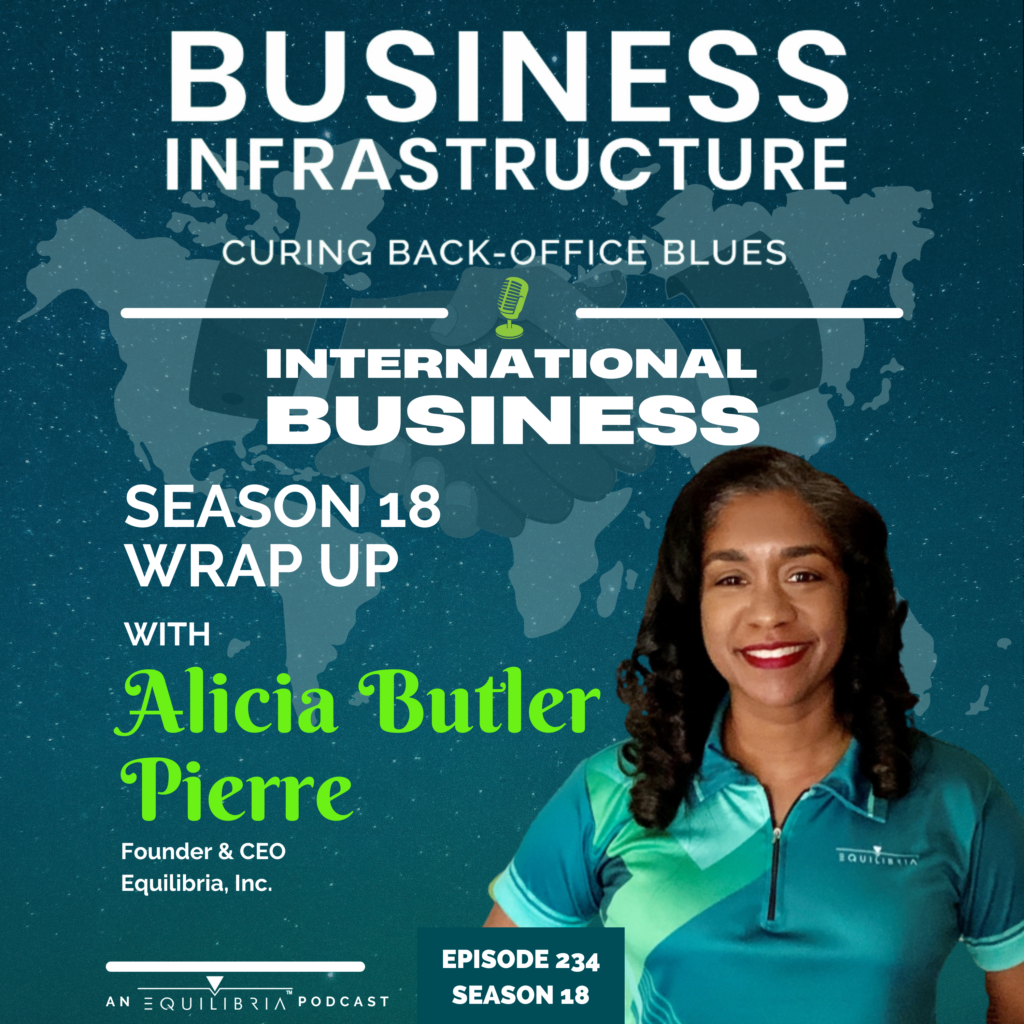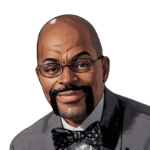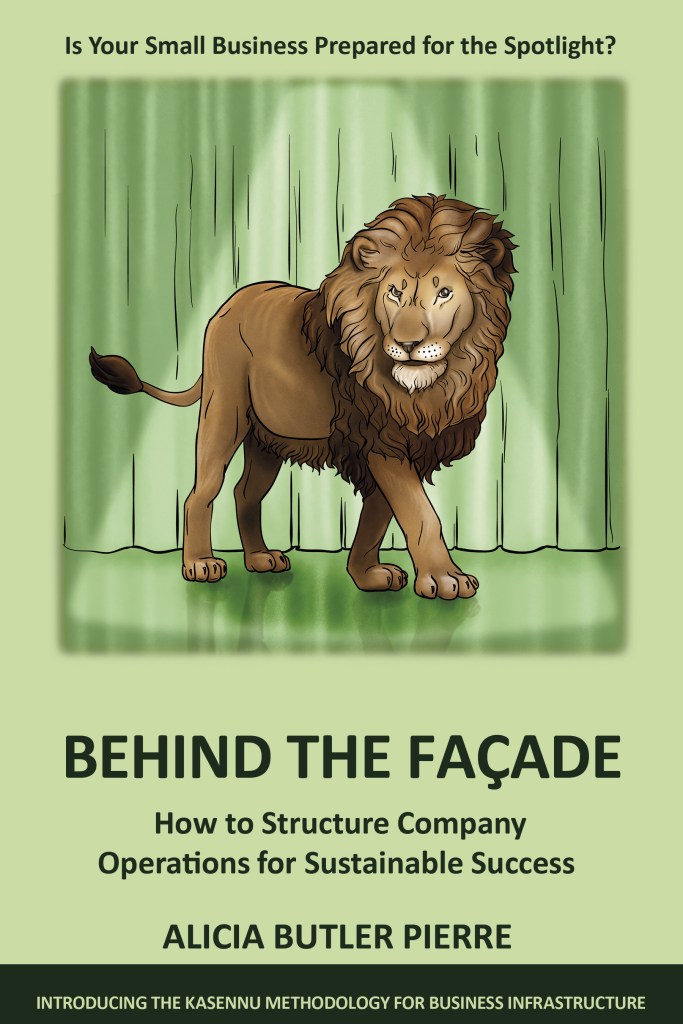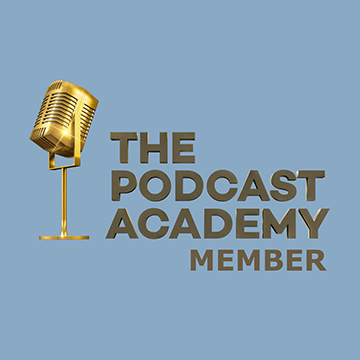It’s the last Sunday of 2022! It also marks the end of our 12-country audio tour on this international business season of the Business Infrastructure podcast.
That’s right – we visited 12 countries in 12 weeks with 14 special guests. In this final episode of Season 18, producer and host Alicia Butler Pierre summarizes key lessons learned as well as five key factors to consider if you are serious about expanding your small business operations or starting a new business altogether in another country. She also hints at what’s coming up in 2023. If you think 2022 had a great episode lineup, then “You ain’t seen nothing yet!”
Discover all this plus additional resources Alicia recommends and more in this commemorative episode!
This episode is sponsored by:
Monologue: Alicia Butler Pierre – Founder & CEO – Equilibria, Inc.
Location: Atlanta, GA USA
Air Date: December 25, 2022
Bios
More About Host, Alicia Butler Pierre:
Alicia Butler Pierre is the Founder & CEO of Equilibria, Inc. Her career in operations began over 20 years ago while working as an engineer in various chemical plants and oil refineries. She invented the Kasennu™ framework for business infrastructure and authored, Behind the Façade: How to Structure Company Operations for Sustainable Success. It is the world’s first published book on business infrastructure for small businesses. Alicia hosts the weekly Business Infrastructure podcast with a global audience across 60 countries.




More About Sponsor, Equilibria, Inc.:
Equilibria, Inc. is an operations management firm specializing in business infrastructure for fast-growing organizations. Our mission is to provide access to tips, resources, and proven frameworks that revolutionize the way small businesses operate. We do that through original podcast episodes, blog posts, videos, presentations, workshops, and coaching sessions.




Transcript
Hello and welcome to the final episode of Season 18!
I’m Alicia Butler Pierre and I’m the producer and host of the Business Infrastructure podcast and, as of this season, your travel buddy. On this show we share practical tips, tactics, and tools to cure the chaos of fast growth in small businesses so that you can operate smoothly and cure those back-office blues.
To say it’s been a whirlwind is an understatement.
Our theme in Season 18 was International Business and as with every new episode this year in 2022, this season was unlike anything we’ve ever done before. We went on a 12-country audio tour.
That’s right 12 different countries over the past twelve weeks. We discussed what’s it like to do business in each of those countries.
Unfortunately, we didn’t get a chance to cover mainland Asia as I hoped to – we simply ran out of time trying to coordinate dates and times with different guests in countries like India and Japan.
But we certainly have great representation across North and South America, Europe, Australia, the Middle East, and the Pacific Islands. We set out on a quest to ask questions like, “What’s it like to do business in your country? What are some myths and misconceptions you’d like to debunk? What’s something people may not realize about living and/or working in your country?”
To keep a diverse and balanced perspective, we talked to both natives and expats alike, even some who proudly proclaim their status as digital nomads.
And in doing so, some common factors began to emerge.
THE COMMON FACTORS
· Those factors that emerged directly impact how you chose to do business in not just the countries we visited this season, but for other countries in general.
· As you decide to venture into another country, you’ll first have to decide whether to partner with an existing business that’s already in that country or relocate and start a business in that country.
· There are five key factors that I observed every guest mention, and they are: residency, language, time zones, licenses/taxes/legal structure, and payments – all of which require a solid business infrastructure to put in place.
· If you’re new to the show, business infrastructure is a system that links people, process, tech so that your ability to scale is manageable, repeatable, profitable, and sustainable. Now let’s get into each of these factors in a little more detail.
· Citizenship. Resident, permanent resident. What does the process look like? Are foreigners allowed to start businesses? Would you as a foreigner have to partner with another entrepreneur who is a citizen of that country? Will you keep your home in your existing country?
· Language. While English is considered to be the language of business in many of the countries we featured this season, there are exceptions like Germany, Mexico, and Brazil. Language barriers will kill any business deal so find out ahead of time whether you should invest in learning the local language (which you should do anyway).
· Visas. Depending on the length of your stay as well as the type of stay, you may need a visa. Some countries like the Philippines don’t require a visa to travel, but others, like Saudi Arabia, do (depending on which country you’re coming from). There’s also work permits. I learned this the hard way traveling into Canada. And there’s digital nomad visas in Europe.
· Payments. Simply put, how will you send and receive money? ACH? Wire transfer? Online portal like Payoneer? How will you price your services? According to your home country or the country where you will conduct business? Will you take advantage of labor arbitrage?
· Licenses, Taxes, Legal Structure. Get a lawyer! And…and Accountant!
· And as a bonus – keep an open mind!!!! Just because something is different from the way you might be used to doing it, doesn’t mean it’s bad, it’s just different.

Thank you so much for listening! If you enjoyed this episode, then subscribe to the show and leave a five-star rating and review wherever you’re listening.
Coming up in the next episode, you’ll hear a story from someone who actually uses storytelling to help other organizations scale. Trust me, you don’t want to miss it!
Growing and scaling a business is no small feat, but remember, Stay focused. Be encouraged. This entrepreneurial journey is a marathon and not a sprint. Until then, keep operating smoothly as you work to cure your company’s back-office blues.
This episode was written, produced, and narrated by me, Alicia Butler Pierre. Audio editing by Olanrewaju Adeyemo. Original score and sound design by Sabor! Music Enterprises.
This is the Business Infrastructure – Curing Back-Office Blues podcast.










